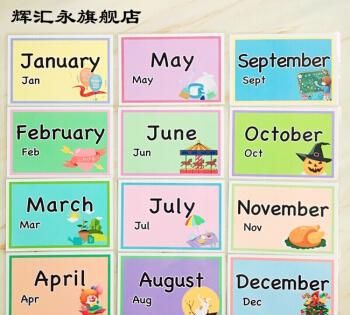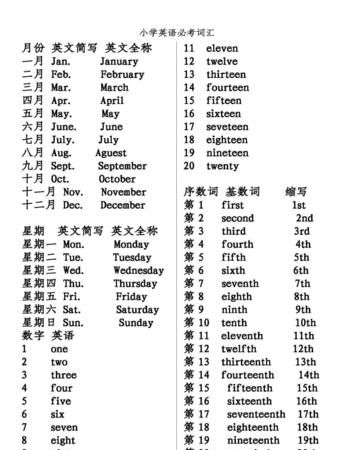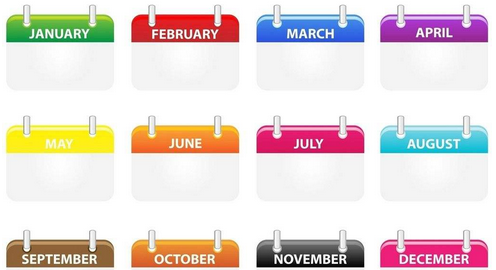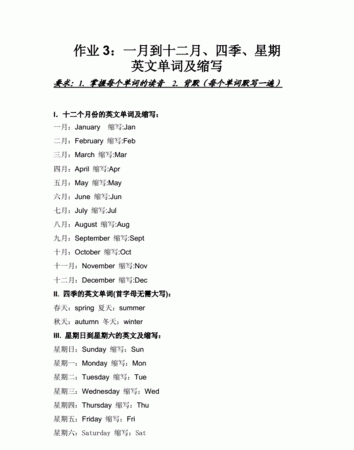本文目录
英语月份背后的故事
1
January 一月
January is named after the Roman god Janus, who presided over doors and beginnings – appropriately enough, for the beginning of the year (though this is, as you will discover, not as straightforward as it seems). Indeed, Janus was usually depicted with two faces looking backwards and forwards, as is often characteristic of a new year; this also gave rise to the term Janus word for words that have two opposite meanings.
January是以罗马神话中双面神杰纳斯(Janus)的名字命名的。他负责司守门户以及万物的始末——作为一年的开始,他很适合(尽管你会发现,其实并没有那么直观)。事实上,杰纳斯通常以双面孔示人,一面回顾过去,一面注视未来,而这经常被视为新的一年的特征;这也使得它的引申词组“Janus word”(双面词)表示兼有两种相反含义的词。
2
February 二月
February is ultimately based on Latin februarius, from februa. In case that’s not helped things become clearer, februa was the name of a purification feast held on the 15th of this month. February is a divisive issue in modern pronunciation, with both Feb-yoo-ary and Feb-roo-ary being commonly heard.
February由拉丁语“februa”的衍生词“februarius”演变而来。可能这样说并没有解释得很清楚,这里再补充一下:“februa”是这个月十五号举行的一场涤罪盛宴的名称。在现代英语中,人们对“February”的发音产生了分歧,最常听到的有两种,一种是“Feb-yoo-ary”,还有一种是“Feb-roo-ary”。
3
March 三月
Which god gets a planet and a month named after him? You’ve guessed it: Mars. Why him? As the Oxford English Dictionary notes, ‘In ancient Rome several festivals of Mars took place in March, presumably in preparation for the campaigning season, since Mars was a god of war.’
有哪位神的名字既是一个星球的名字,又是一个月份的名字呢?你们已经猜到了:马尔斯(Mars)。为什么是他?《牛津英语词典》上记载:“在古罗马时期,一些有关于马尔斯的节日都在三月举行,想必是为了战争时期做准备,因为马尔斯是一位战神。”
4
April 四月
We know that the English word April comes from the Latin Aprillis, the fourth month of the ancient Roman calendar, but things are less clear after that. In Old English, April was also sometimes called Eastermonab, ‘Easter month’.
我们知道英文词汇“April”来源于拉丁语“Aprillis”,是古罗马日历的第四个月,但除此之外,我们就不太清楚了。在古英语中,四月有时也被称为“Eastermonth”,即“复活月”。
5
May 五月
The month is connected with the goddess Maia. Perhaps less well known now than the other deities with months named after them, Maia (in Greek mythology) was daughter of Atlas and mother of Hermes. She was considered a nurturer and an earth goddess, which may explain the connection with this springtime month. Although may is a common modal verb, the month and the word are unrelated.
这个月与玛雅女神(the goddess Maia)有关。与其他神相比,也许玛雅并没有那么为人们所熟知,在希腊神话中,她是阿特拉(Atlas)之女,同时也是赫尔墨斯(Hermes)之母。她被誉为养育者和大地女神,这或许可以解释为什么它是属于春季的月份。尽管“may”经常被用作情态动词,但它与五月并没有关系。
6
June 六月
Having conceded one month to a Greek deity, we’re now back with the Romans: June is named after the ancient Roman goddess Juno, wife of Jupiter and goddess of marriage and childbirth. June was also once sometimes known as midsummer month.
前面已经有一个月是以希腊女神命名的了,现在我们再次回到罗马的神灵:六月是以古罗马女神朱诺(Juno)命名的。她是主神朱庇特(Jupiter)的妻子,是婚姻与分娩之神。六月也曾一度被认为是仲夏月。
7
July 七月
The first month in the calendar named after a real person, July was named in honour of Julius Caesar after his death in 44 BC, July being the month of his birth. Before it was renamed, the month was known as Quintilis (borrowed into English as Quintile), which means ‘fifth’. If you’ve been counting, you’ll know that July isn’t the fifth month: we’ll come on to that when we reach September and October.
July是日历中第一个以真实的人物命名的月份,七月的命名是为了纪念尤里乌斯•凯撒(Julius Caesar)。公元前44年,凯撒大帝去世,七月是他出生的月份。在更名之前,这个月叫做“Quintilis”(英语则为“Quintile”),意为“第五”。如果你数过了的话,你会发现七月并不是第五个月:这一点在说到九月和十月的时候我们会做出解释。
8
August 八月
Following suit, in 8 BC, the month Sextilis (‘sixth’) was renamed after Augustus, the first Roman emperor, who had died six years earlier. Augustus himself was given this title when he became emperor, having previously been known as Octavian. It came from the Latin augustus meaning ‘consecrated, venerable’ which gave rise to the English adjective august, ‘respected and impressive’.
同样地,在公元前8年,“Sextilis” (‘sixth’)这个月以古罗马第一位帝王奥古斯都(Augustus)来命名,他本人早于六年前去世。奥古斯都是他在成为帝王之时为自己改的名字,在这之前,他叫奥克塔维安(Octavian)。这个词来源于拉丁语“augustus”,意为“神圣的、值得尊敬的”,由此,august在做形容词时有“值得尊敬的”的意思。
9
September 九月
September follows on from Quinitlis and Sextilis, in that it comes from the Latin septem, ‘seven’. As with those (and the rest of the calendar), the numbering is a bit off now: September was originally the seventh month in an ancient Roman ten-month calendar, which started with March.
“September”排在“Quinitlis”和“Sextilis”之后,是因为它来源于拉丁语“septem”,在这里是指第七个月。到这里,这些月份(以及日历中其它月份)的排序方式就有点混乱了:在古罗马的十月制日历中,September是第七个月份,那个日历是从March开始的。
10
October 十月
More of the same: octo is the Latin for ‘eight’, for that ten month calendar. Two months were added to the end of the calendar year around 713 BC, and the beginning of the year was moved to 1 January in 153 BC.
同理,“octo”在拉丁语中是八的意思,因此在十月历中,它是指第八个月。在公元前713年左右,日历年的年底又加了两个月,公元前153年将一月一日作为一年的开始。
1
January 一月
January is named after the Roman god Janus, who presided over doors and beginnings – appropriately enough, for the beginning of the year (though this is, as you will discover, not as straightforward as it seems). Indeed, Janus was usually depicted with two faces looking backwards and forwards, as is often characteristic of a new year; this also gave rise to the term Janus word for words that have two opposite meanings.
January是以罗马神话中双面神杰纳斯(Janus)的名字命名的。他负责司守门户以及万物的始末——作为一年的开始,他很适合(尽管你会发现,其实并没有那么直观)。事实上,杰纳斯通常以双面孔示人,一面回顾过去,一面注视未来,而这经常被视为新的一年的特征;这也使得它的引申词组“Janus word”(双面词)表示兼有两种相反含义的词。
2
February 二月
February is ultimately based on Latin februarius, from februa. In case that’s not helped things become clearer, februa was the name of a purification feast held on the 15th of this month. February is a divisive issue in modern pronunciation, with both Feb-yoo-ary and Feb-roo-ary being commonly heard.
February由拉丁语“februa”的衍生词“februarius”演变而来。可能这样说并没有解释得很清楚,这里再补充一下:“februa”是这个月十五号举行的一场涤罪盛宴的名称。在现代英语中,人们对“February”的发音产生了分歧,最常听到的有两种,一种是“Feb-yoo-ary”,还有一种是“Feb-roo-ary”。
3
March 三月
Which god gets a planet and a month named after him? You’ve guessed it: Mars. Why him? As the Oxford English Dictionary notes, ‘In ancient Rome several festivals of Mars took place in March, presumably in preparation for the campaigning season, since Mars was a god of war.’
有哪位神的名字既是一个星球的名字,又是一个月份的名字呢?你们已经猜到了:马尔斯(Mars)。为什么是他?《牛津英语词典》上记载:“在古罗马时期,一些有关于马尔斯的节日都在三月举行,想必是为了战争时期做准备,因为马尔斯是一位战神。”
4
April 四月
We know that the English word April comes from the Latin Aprillis, the fourth month of the ancient Roman calendar, but things are less clear after that. In Old English, April was also sometimes called Eastermonab, ‘Easter month’.
我们知道英文词汇“April”来源于拉丁语“Aprillis”,是古罗马日历的第四个月,但除此之外,我们就不太清楚了。在古英语中,四月有时也被称为“Eastermonth”,即“复活月”。
5
May 五月
The month is connected with the goddess Maia. Perhaps less well known now than the other deities with months named after them, Maia (in Greek mythology) was daughter of Atlas and mother of Hermes. She was considered a nurturer and an earth goddess, which may explain the connection with this springtime month. Although may is a common modal verb, the month and the word are unrelated.
这个月与玛雅女神(the goddess Maia)有关。与其他神相比,也许玛雅并没有那么为人们所熟知,在希腊神话中,她是阿特拉(Atlas)之女,同时也是赫尔墨斯(Hermes)之母。她被誉为养育者和大地女神,这或许可以解释为什么它是属于春季的月份。尽管“may”经常被用作情态动词,但它与五月并没有关系。
6
June 六月
Having conceded one month to a Greek deity, we’re now back with the Romans: June is named after the ancient Roman goddess Juno, wife of Jupiter and goddess of marriage and childbirth. June was also once sometimes known as midsummer month.
前面已经有一个月是以希腊女神命名的了,现在我们再次回到罗马的神灵:六月是以古罗马女神朱诺(Juno)命名的。她是主神朱庇特(Jupiter)的妻子,是婚姻与分娩之神。六月也曾一度被认为是仲夏月。
7
July 七月
The first month in the calendar named after a real person, July was named in honour of Julius Caesar after his death in 44 BC, July being the month of his birth. Before it was renamed, the month was known as Quintilis (borrowed into English as Quintile), which means ‘fifth’. If you’ve been counting, you’ll know that July isn’t the fifth month: we’ll come on to that when we reach September and October.
July是日历中第一个以真实的人物命名的月份,七月的命名是为了纪念尤里乌斯•凯撒(Julius Caesar)。公元前44年,凯撒大帝去世,七月是他出生的月份。在更名之前,这个月叫做“Quintilis”(英语则为“Quintile”),意为“第五”。如果你数过了的话,你会发现七月并不是第五个月:这一点在说到九月和十月的时候我们会做出解释。
8
August 八月
Following suit, in 8 BC, the month Sextilis (‘sixth’) was renamed after Augustus, the first Roman emperor, who had died six years earlier. Augustus himself was given this title when he became emperor, having previously been known as Octavian. It came from the Latin augustus meaning ‘consecrated, venerable’ which gave rise to the English adjective august, ‘respected and impressive’.
同样地,在公元前8年,“Sextilis” (‘sixth’)这个月以古罗马第一位帝王奥古斯都(Augustus)来命名,他本人早于六年前去世。奥古斯都是他在成为帝王之时为自己改的名字,在这之前,他叫奥克塔维安(Octavian)。这个词来源于拉丁语“augustus”,意为“神圣的、值得尊敬的”,由此,august在做形容词时有“值得尊敬的”的意思。
9
September 九月
September follows on from Quinitlis and Sextilis, in that it comes from the Latin septem, ‘seven’. As with those (and the rest of the calendar), the numbering is a bit off now: September was originally the seventh month in an ancient Roman ten-month calendar, which started with March.
“September”排在“Quinitlis”和“Sextilis”之后,是因为它来源于拉丁语“septem”,在这里是指第七个月。到这里,这些月份(以及日历中其它月份)的排序方式就有点混乱了:在古罗马的十月制日历中,September是第七个月份,那个日历是从March开始的。
10
October 十月
More of the same: octo is the Latin for ‘eight’, for that ten month calendar. Two months were added to the end of the calendar year around 713 BC, and the beginning of the year was moved to 1 January in 153 BC.
同理,“octo”在拉丁语中是八的意思,因此在十月历中,它是指第八个月。在公元前713年左右,日历年的年底又加了两个月,公元前153年将一月一日作为一年的开始。

12个月份的英文单词
12个月份的英文单词
2月是阳历年中的第二个月,平年有28天,闰年有29天。英文中的2月(February)来源于古罗马的Februus(斋戒月),也可能是源自于萨拜恩。下面有我整理的十二个月份的英语单词,欢迎大家阅读!
一月 January
二月 February
三月 Marcy
四月 April
五月 May
六月 June
七月 July
八月 August
九月 September
十月 October
十一月 November
十二月 December
月份缩写
一月:Jan
二月:Feb
三月:Mar
四月:Apr
五月:May
六月:Jun
七月:Jul
八月:Aug
九月:Sept
十月:Oct
十一月:Nov
十二月:Dec
月份节气的故事:二月 立春
春气始至,立春是在四日的七时一分。
“日光开始温柔照耀的时候,请告诉我,"地上的青虫对荷叶上的绿蛙说。
“我忙得很呢!我还要告诉茄子、白芋、西瓜、壅菜、肉豆、荇菜,它们发芽的'时间到了。"蛙说。“那 谁来告诉我春天到来了呢?"青虫说。
“你可以静听远方的雷声或者仕女们踏青的脚步声呀!"蛙说。
青虫遂伏耳静听,先听见的竟是抽芽的青草血液流动的声音。
;
1至12个月份的英语单词
12个月份的英语单词分别是:January,February,March,April,May,June,July,August,September,October,November,December。
1、英语单词的产生是汉英两种语言双向交流的产物,一些带有中国特色的名称和概念进入了英语词汇,同时还有一些英语词汇进入了汉语,在文化环境中衍生出新的含义,形成了英语词汇的语义文化特征。
2、在旧石器时代的早期,人类就已经会依据月相来计算日子。迄今,朔望月仍是许多历法的基石。一年分为12个月;中国农历一年也为12个月,农历的闰年为13个月,多出的一个月称为闰月。

扩展资料:
1、April,罗马的4月,正是大地回春、鲜花初绽的美好季节。英文4月April便由拉丁文Aprilis(即开花的日子)演变而来。
2、July,罗马统治者朱里斯·凯撒被刺身亡后,著名的罗马将军马克·安东尼建议将凯撒大帝诞生的7月,用凯撒的名字——拉丁文Julius(即朱里斯)命名之。这一建议得到了元老院的通过。英语7月July 由此演变而来。
3、September,老历法的7月,正是凯撒大帝改革历法后的9月,拉丁文 Septem是“7”的意思。虽然历法改革了,但人们仍袭用旧名称来称呼9月。英语9月September,便由此演变而来。
4、october。英语10月,来自拉丁文 Octo,即“8”的意思。它和上面讲的9月一样,历法改了,称呼仍然沿用未变。
参考资料:百度百科_月份 百度百科_英语单词
用2个英语月份单词编成搞笑奇葩的故事是什么
本人自己编的,有点离奇和小押韵,但可以帮助记忆单词。
Janurary is a beautiful Japanese girl and her birthday is in February.
She goes to school in March and eats much .
After school in April,she find a job in May and maybe she don't like the job.
She has two best twin friends, June and July.
They all like cute August boy and dislike sick September man.
October is OK but November is not a gentlman .
December is from Danmark. He can make delicious dinner.

以上就是关于2个英文月份的单词编成故事 ,英语月份背后的故事的全部内容,以及12个英文月份的单词编成故事 的相关内容,希望能够帮到您。
